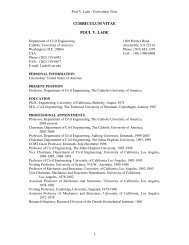Nota Bene-- C:\ARTICLES\TERMIN~1.NB Job 1 - the Catholic ...
Nota Bene-- C:\ARTICLES\TERMIN~1.NB Job 1 - the Catholic ...
Nota Bene-- C:\ARTICLES\TERMIN~1.NB Job 1 - the Catholic ...
You also want an ePaper? Increase the reach of your titles
YUMPU automatically turns print PDFs into web optimized ePapers that Google loves.
etween doing and believing that permeates Rom. 9:30-10:13,” see Schreiner, Romans, 551-54;<br />
Moo, Romans, 650 n. 23.<br />
21 That Paul’s audience is generally quite familiar with <strong>the</strong> original context of his scriptural<br />
citations is key to our argument. Paul’s OT quotes are “allusive echoes” and examples of <strong>the</strong><br />
rhetorical figure known as metalepsis, “a device that requires <strong>the</strong> reader to interpret a citation or<br />
allusion by recalling aspects of <strong>the</strong> original context that are not explicitly quoted,” according to<br />
R. B. Hays, “Echoes of Scripture in <strong>the</strong> Letters of Paul: Abstract,” Paul and <strong>the</strong> Scriptures of<br />
Israel (JSNTSup 83; eds. C. A. Evans and J. A. Sanders; Sheffield: Sheffield Academic Press,<br />
1993) 43. See also R. B. Hays, Echoes of Scripture in <strong>the</strong> Letters of Paul (New Haven: Yale<br />
University Press, 1989) 20: “Allusive echo functions to suggest to <strong>the</strong> reader that text B should<br />
be understood in light of a broad interplay with text A, encompassing aspects of A beyond those<br />
explicitly echoed.” Although we are subscribing in general to this principle as described by<br />
Hays, we do not necessarily agree with <strong>the</strong> way that he applies it in every case nor with <strong>the</strong><br />
conclusions he reaches on particular Pauline citations.<br />
22 Paul has subtly altered Lev 18:5b to suit his purpose:<br />
LXX Lev 18:5b: και` ποιη' σετε αυ� τα' , α� ποιη' σας α»νθρωπος ζη' σεται ε� ν αυ� τοι^ς<br />
Rom 10:5b: ο� ποιη' σας αυ� τα` α»νθρωπος ζη' σεται ε� ν αυ� τοι^ς<br />
Noteworthy is how Paul has converted <strong>the</strong> neuter plural relative pronoun α« to <strong>the</strong> masculine<br />
singular relative pronoun ο� , and how he has transposed from <strong>the</strong> preceding clause <strong>the</strong> neuter<br />
plural pronoun αυ� τα' , referring to “all my commands and all my decrees,” into his citation. For<br />
fuller discussions, see D.-A. Koch, Die Schrift als Zeuge des Evangeliums: Untersuchungen zur<br />
Verwendung und zum Verständnis der Schrift bei Paulus (BHT 69; Tübingen: Mohr Siebeck,<br />
1986) 294; C. D. Stanley, Paul and <strong>the</strong> Language of Scripture: Citation Technique in <strong>the</strong> Pauline<br />
Epistles and Contemporary Literature (SNTSMS 69; Cambridge: Cambridge University Press,<br />
1992) 126-28.<br />
23 J. W. Wevers, Notes on <strong>the</strong> Greek Text of Leviticus (SBLSCS 44; Atlanta: Scholars<br />
Press, 1997) 274-75: “LXX subordinates <strong>the</strong> verb השעי to a participle, ποιη' σας, <strong>the</strong>reby placing<br />
19
















